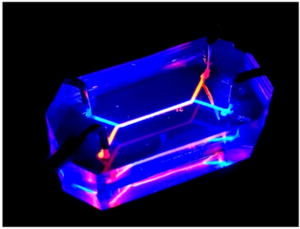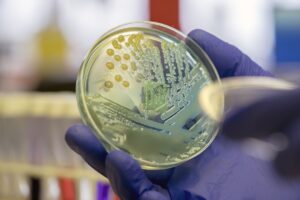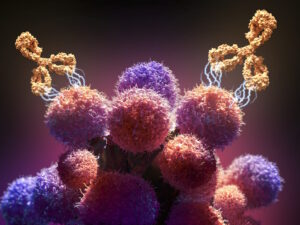Research
Integrated Transporter Elucidation Center

The placenta delivers nutrients to the baby and protects against damage from medications and toxicants. We are developing new, exciting scientific approaches to study how chemicals pass across the placenta aided by transporter proteins and train scientists and clinicians at the intersections of pharmacology, chemistry, computer science, public health, medicine, and bioengineering. Our InTEC center is part of a nationwide Transporter Elucidation Network sponsored by NIH.
Read more: NIH/NICHD Grant: UC2HD113039
Checkpoint-Inhibitor Kidney Injury
Immunotherapies are new medications used treat a variety of cancers. Treatment with immunotherapies, such as checkpoint inhibitors, result in toxicity to the kidneys by activating the immune system. We are studying how immunotherapies affect the immune system and damage the kidneys and ways to identify this toxicity early in cancer treatment. This is being accomplished using a novel humanized mouse model and a longitudinal cohort study.
Read more: NIH/NCI Grant: R01CA277313
Drug Disposition and Nephrotoxicity
Cisplatin is a drug used commonly in chemotherapy to treat a variety of cancers. Treatment with cisplatin results in toxicity to the kidneys in up to one-third of patients, which is detected by traditional and novel biomarkers. Protein biomarkers in the urine allow of non-invasive monitoring of structural kidney damage over time. We are completing in vitro studies and a clinical trial into how drugs that prevent nausea and vomiting affect the body’s handling of cisplatin and susceptibility to kidney toxicity.
Read more: NIH/NIGMS Grant: R01GM123330
Chemical Toxicity in Pregnancy
Cadmium is a metal commonly used in the electronics industry and widely found as a contaminant in food. Exposure to cadmium during pregnancy impairs the growth of the offspring by affecting critical placental pathways. This project is near completion and has used highly translational approaches to characterize barrier mechanisms, such as transporters, that can protect the placenta from cadmium toxicity and identify babies at the greatest risk of growth changes following cadmium exposure.
Read more: NIH/NIEHS Grant: R01ES029275
Predicting Liver Toxicity

Hepatotoxicity is a leading safety concern in the development of new chemicals. Our team is assisting lead scientist Dr. Hao Zhu at Tulane University in creating a virtual “Adverse Outcome Pathway” models that directly evaluates the hepatotoxicity potentials of chemicals using massive public toxicity data. This website will be a publically-accessible, web-based search engine to evaluate new chemicals for risk of hepatotoxicity. Our team performs in vitro liver toxicity screens including activation of NRF2-ARE signaling and disruption of mitochondria integrity – these data are used to improve the predictive computational models.
Read more: NIH/NIEHS Grant: R01ES031080
Natural Products to Protect the Kidneys

Drugs are responsible for roughly 1/4 of acute kidney injury cases, and antibiotics are implicated in almost half of these events. Broad spectrum antibiotics, such as vancomycin, are frequently used in hospitalized patients with bacterial infections. Targeting the NRF2 transcriptional pathway has great potential to up-regulate antioxidant responses and restore mitochondrial membrane potential. Working under lead scientist Dr. Luigi Brunetti in the School of Pharmacy, the team is studying whether melatonin, a dietary supplement, decreases kidney toxicity in a human clinical trial and probing its protective mechanisms.
Read more: NIH/NIDDK Grant: R01DK131214


